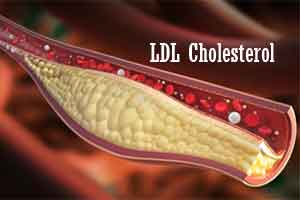- Home
- Editorial
- News
- Practice Guidelines
- Anesthesiology Guidelines
- Cancer Guidelines
- Cardiac Sciences Guidelines
- Critical Care Guidelines
- Dentistry Guidelines
- Dermatology Guidelines
- Diabetes and Endo Guidelines
- Diagnostics Guidelines
- ENT Guidelines
- Featured Practice Guidelines
- Gastroenterology Guidelines
- Geriatrics Guidelines
- Medicine Guidelines
- Nephrology Guidelines
- Neurosciences Guidelines
- Obs and Gynae Guidelines
- Ophthalmology Guidelines
- Orthopaedics Guidelines
- Paediatrics Guidelines
- Psychiatry Guidelines
- Pulmonology Guidelines
- Radiology Guidelines
- Surgery Guidelines
- Urology Guidelines
ORION-10: Inclisiran demonstrates as much as 58% reduction in LDL C

A novel lipid-lowering agent inclisiran which is injected just twice yearly subcutaneously has been confirmed to be a convenient and effective lipid reducing agent in patients already taking statins in a second phase 3 trial. The trial showed as much as 58% reduction in low-density lipoprotein (LDL) cholesterol over the 18-month study period, with no difference in safety compared with placebo in patients with the established atherosclerotic cardiovascular disease already taking statins. The ORION-10 study was presented at the American Heart Association (AHA) Scientific Sessions 2019.
High levels of LDL cholesterol can build up on the walls of blood vessels called “plaque" thereby increasing risk of heart disease and stroke.
In order to control high levels of LDL cholesterol, heart-healthy lifestyle changes are adopted and medicines are taken. The lifestyle changes include healthy eating, weight management, and regular physical activity. But in some cases despite maximum dosages of cholesterol-lowering agents like Statins ideal LDL cholesterol levels are not achieved. In such cases, new options need to be explored and inclisiran is one such drug.
According to data of the ORION-10 trial presented at the American Heart Association's Scientific Sessions 2019,in patients already taking the maximum dose of statin drugs, twice-yearly injections of an experimental cholesterol-lowering drug, inclisiran, were effective at reducing low-density lipoprotein (LDL) cholesterol.
"Maintaining low LDL over a sustained period is essential to reduce the risk of heart attacks and stroke," says R. Scott Wright, M.D., a Mayo Clinic cardiologist and principal investigator of ORION-10 trial.
ORION-10, a phase 3 placebo-controlled, double-blind, randomized study at 145 U.S. sites, enrolled 1,561 participants with established atherosclerotic cardiovascular disease (a disease where plaque builds up in the arteries) and elevated LDL (greater than 70 milligrams per deciliters), despite maximum tolerated oral statin therapies. Participants received inclisiran or placebo by subcutaneous injections at baseline, and then at three months and every six months thereafter.
Inclisiran, developed by The Medicines Company, is a siRNA (small interfering RNA) drug and the only cholesterol-lowering medication in its class. The medication mimics a gene variant and prevents the production of the protein PCSK9, which in turn lowers LDL.
Results showed that inclisiran dosed initially, and then again at three months and every six months thereafter, resulted in placebo-adjusted LDL reductions of 58% at day 510 and demonstrated time-averaged, placebo-adjusted LDL reductions of 56% from days 90 through 540.
"The data show that inclisiran dosed twice-yearly achieved durable and potent LDL reductions with an excellent safety profile, and no treatment-related liver or kidney side effects," Dr Wright says. "Twice-yearly administration by a health care professional coincides with typical patient visits, which can help with medication adherence."
American Heart Association (AHA) Scientific Sessions 2019. Presented November 16.
cardiaccholesterolDr. R. Scott Wrightheart-attackHigh LDL CholesterolInclisiranLDLmedical researchnews releasesORION-10statins
Source : Mayo ClinicNext Story
NO DATA FOUND

Disclaimer: This site is primarily intended for healthcare professionals. Any content/information on this website does not replace the advice of medical and/or health professionals and should not be construed as medical/diagnostic advice/endorsement or prescription. Use of this site is subject to our terms of use, privacy policy, advertisement policy. © 2020 Minerva Medical Treatment Pvt Ltd